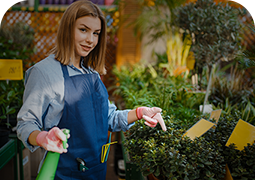Urban gardening has been embraced to foster sustainable urban development and improve the environment. It offers many benefits, such as improved air quality, reduced pollution, and lower energy consumption. Urban gardeners play an important role in protecting and preserving natural resources, promoting biodiversity, and creating healthier communities. This article provides seven tips on how to get started with urban gardening and make a positive contribution to the environment. Let’s get started!

Tip 1: Assess Your Space
The first step in the urban gardening journey is to assess your available space. How much of it do you have? What type of soil do you have access to? Do you have an area where you can comfortably set up a small garden bed or even a few containers? These are important questions that need to be answered before starting any kind of gardening project.
Tip 2: Choose Appropriate Plants
Before choosing the plants for your garden, consider factors such as climate, soil type, and available sunlight. Native plants are always a good choice because they are used to the local climate and don’t need much care. Additionally, selecting drought-tolerant plants that require less water will help your environmental cause even further.
Tip 3: Implement Sustainable Practices
Sustainable gardening practices such as composting, mulching, and using organic fertilizers can go a long way toward helping you achieve an environmentally friendly urban garden. Composting helps to decrease the amount of waste that goes into landfills and also nurtures the soil with natural nutrients. Mulching helps conserve water by preventing evaporation and providing insulation for plants during colder weather. Using organic fertilizers and pesticides minimizes pollution, prevents water contamination, and reduces the health risks associated with chemical-based products.
Tip 4: Conserve Water
When it comes to urban gardening, water conservation is of the utmost importance. Investing in smart irrigation systems, such as drip or soaker hoses, can help you save both water and energy. Also, use mulch and other organic matter around plants to cut down on water loss and keep the soil moist.
Tip 5: Make Use of Recycled Materials
Using recycled materials is a great way to conserve resources and minimize pollution. You can use old tires and wood or plastic containers to create planters for your garden. In addition, you can also use newspaper and cardboard as mulch or potting soil amendments.
Tip 6: Grow Food
Growing food in urban areas is an excellent way to promote sustainable development and reduce your carbon footprint. Growing vegetables, fruits, herbs, and even sprouts can be both rewarding and educational. You can also look into getting involved with a local community garden or start growing your own kitchen garden at home.
Tip 7: Get Involved in Local Projects
Getting involved with local projects or initiatives that promote urban gardening can be a great way to make a positive contribution to the environment. Look into what’s happening in your area and get involved with organizations or initiatives that are committed to promoting sustainable urban gardening practices.
Conclusion
Urban gardening is a great way to promote sustainable development and help protect the environment. With some guidance and planning, urban gardeners can create thriving gardens that provide both beauty and sustenance. By following the tips outlined in this article, you, too, can join the ranks of urban gardeners and help build healthier, more vibrant communities!









